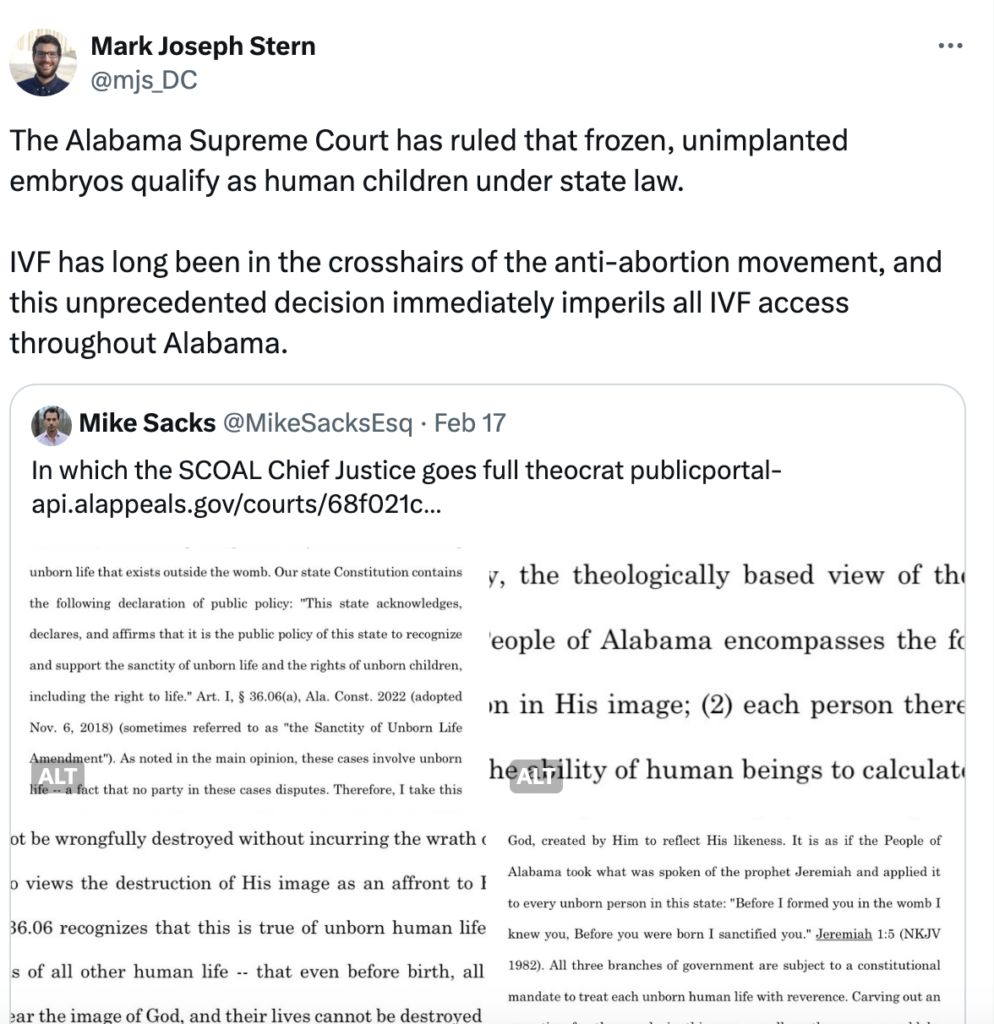What The Alabama Supreme Court’s Ruling On Frozen Embryos Means For Big Fertility
The Alabama Supreme Court reaffirmed the indisputable scientific fact that life begins at conception last week when it ruled that “all unborn children,” including extrauterine embryos, are humans under the state’s Wrongful Death of a Minor Act.
Until now, embryos created outside of the womb with assisted reproductive technology were legally considered property, not people. The Alabama Supreme Court’s decision, however, paves the way for the sanctity of unborn life to become an important consideration for states seeking to apply their laws- especially when it comes to reproductive technologies.
The Sanctity Of Extrauterine Life
The Cotton State case dates back to 2020 when a patient at Mobile Infirmary Medical Center wandered into the cryogenic portion of the Center for Reproductive Medicine’s allegedly secure facility and tried to remove three separate couples’ embryos from freezer storage.
“The subzero temperatures at which the embryos had been stored freeze-burned the patient’s hand, causing the patient to drop the embryos on the floor, killing them,” the lawsuit states.
The couples that paid big bucks to create and store their lab-manufactured embryos sued the Center under Alabama’s Wrongful Death of a Minor Act for failing to protect what they believed to be their last shot at biological children.
Mobile County Circuit Court Judge Jill Parrish Phillips, however, decided to toss the case in 2022 because she believed “cryopreserved, in vitro embryos involved in this case do not fit within the definition of a ‘person’ or ‘child.’”
Alabama’s highest court rejected and reversed this ruling on Friday when it ruled that the act “applies to all unborn children, regardless of their location,” even if that is outside of a womb.
Justice Jay Mitchell argued in his opinion that the wrongful death act in question specifically does not define “child” and has historically qualified an unborn baby as a “minor.” Even if it did not, Mitchell wrote that Article I, Section 36.06 of the Alabama Consitution, which affirms the “sanctity of unborn life and the rights of unborn children,” compels “courts to resolve the ambiguity in favor of protecting unborn life.”
Since modern science, medicine, many states, and even abortion giant Planned Parenthood have determined life begins at conception, Mitchell said there is no doubt that an “unborn child is a genetically unique human being whose life begins at fertilization and ends at death” under Alabama law.
“The theologically based view of the sanctity of life adopted by the People of Alabama encompasses the following: (1) God made every person in His image; (2) each person therefore has a value that far exceeds the ability of human beings to calculate; and (3) human life cannot be wrongfully destroyed without incurring the wrath of a holy God, who views the destruction of His image as an affront to Himself,” Mitchell wrote.
Big Fertility’s Business Requires Harming Embryos
The Alabama Supreme Court’s ruling sent several allies of Big Fertility into a spiral. The Medical Association of the State of Alabama filed a brief warning that ruling an embryo as an unborn child would harm their business model and make it more expensive to operate.
“The increased exposure to wrongful death liability as advocated by the Appellants would – at best – substantially increase the costs associated with IVF. More ominously, the increased risk of legal exposure might result in Alabama’s fertility clinics shutting down and fertility specialists moving to other states to practice fertility medicine,” they wrote.
A senior writer at Slate also complained that the Alabama Supreme Court’s decision threatens ART, like in vitro fertilization.
“The Alabama Supreme Court has ruled that frozen, unimplanted embryos qualify as human children under state law. IVF has long been in the crosshairs of the anti-abortion movement, and this unprecedented decision immediately imperils all IVF access throughout Alabama,” he wrote.

The premise of the Alabama ruling said nothing about shutting down ART in the state, so why do Big Fertility and its allies feel threatened? Because popularized reproductive technologies like IVF hinge on the destruction of hundreds of millions of embryos each year.
Embryos manufactured outside of the womb are created using IVF, a process requiring a specialized medical professional to harvest mature sperm and eggs and then manually join them in a “test tube,” that must be cryogenically preserved until transferred to a womb. In some cases, like the one million embryos sitting in storage in the U.S., these unborn children are indefinitely sentenced by the people who paid for their creation to frozen life in a lab, which reduces their chances of survival.
Overall, just 7 percent of the babies conceived via IVF make it to pregnancy. Those who survive life in a petri dish are subject to a ranking process that pits frozen siblings against each other. Embryo “grading” often results in the discard of unwanted or seemingly “low quality” embryos, even though data suggests those deemed likely unviable can and do yield successful pregnancies.
Some embryos finally make it through the ins and outs of lab life only to become the unfortunate victims of “selective reduction” in the womb, the abortion of a growing unborn child over their sex, or the fact that there is more than one developing child.
A ruling affirming embryos, even in their most vulnerable form outside of the uterus, are human lives suggests the multibillion-dollar fertility industry, at least in Alabama, could face legal consequences for continually promoting and executing the destruction of their clients’ future children.
Jordan Boyd is a staff writer at The Federalist and co-producer of The Federalist Radio Hour. Her work has also been featured in The Daily Wire, Fox News, and RealClearPolitics. Jordan graduated from Baylor University where she majored in political science and minored in journalism. Follow her on Twitter @jordanboydtx.





Comments are closed.